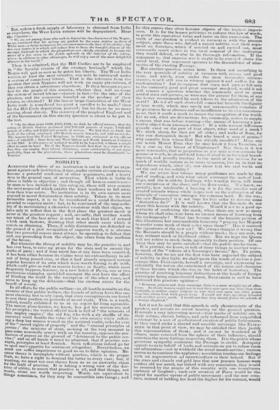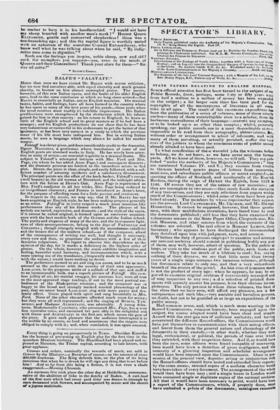NOBILITY.
ALTHOUGH the abuse of an institution is not in itself an argu- ment against such institution, it may, under certain circumstances, become a powerful conflitnet of other arguments, and a heavy item in the general sum of accusation. That which is liable to abuse is liable to objection ; and though all human contrivances be more or less included in this category, those will ever remain the most respected which exhibit the least tendency to fall away from their true estate. No institution is in its own nature more exposed to moral deterioration than nobility. Taken in its most favourable aspect, it is to be considered as a social distinction awarded to superior merit : but, to be convinced of the impossibi- lity of its maintaining a character consistent with that object, we have only to reflect that in the first place the greatest mesit is never in the greatest request ; and, secondly, that neither worth nor talent of the best order is used to seek that kind of reward which rank bestows, deeming that other much rarer which it counts on obtaining. Thus, if mild° distinctions are defended on the ground of a just recognition of superior worth, it is obvious that two powerful causes must always be operating to defeat that end, one proceeding from the object, the other from the medium of the favour.
But whatever the theory of nobility may be, the practice is. and has ever been, to raise up props for the state and to recruit the ranks of party; and if true merit has at any time been ennobled, it has been either because its claims were too extraordinary to ad- mit of being passed over, or that it had already acquired certain popular honours of its own which were worth having to do with, which could give as well as receive lustre; or finally, which most frequently happens, because, in a new batch of Peers, one or two meritorious examples sprinkled amongst the rest have the effect of blinding the world to the corruption of the other cases, mid serve to keep up the delusion—that the custom exists for the benefit of society. In all efforts for the public welfare—in all hostile assaults on the enemies of that public welfare, the friends of reform have this one most cheering fact to rely upon, that even corruptionists are forced to rest their position on grounds of moral right. This is a truth, indeed, usually exhibited to us in an aspect far from agreeable. lhe merest place-hunter, we know, has got his sentiments and hits principles ; the veriest official hack is full of " the interests of this mighty empire ;" the old fox, who with a sly shuffle of the currency could double the value of his own estates while inflict- ing a deep but unseen wound on the national credit, talks fur ever of the "sacred rights of property" and the " eternal principles of Justice; the minister of state, seeking at the very moment to pass some unusually scurvy trick on the country, opposes the pro- d.uctio.n of papers on the ground of "detriment to the public ser-• vice; and on all hands it must be admitted, that if practice cor- rupts,principles at least flourish. Such reflections indeed go far to spoil one's appetite for sentiment altogether. Nevertheless, we must not suffer impatience to goad us on to false opinions. Be- cause theory is incomplete without practice, which is its proper fruit,. we have a right to demand the latter in every case; but, if wanting, we must not cast theory from us as an unworthy cheat for the fault of practice. It is taking a wrong view of the doc- trine of utility, to assert that practice is all, and that things, not words, alone are worth respecting. Words are equivalent to things sometimes, for they may be convertible into things; and
for this reason they often become objects of the Mabee,. import- ance. It es for the honest politieiau to enforce this law of word, to proee this equivalent value and insist on this conversion. The truth of our position is evident ie connexion with the present subject, since those who defend a patent nobility rest their argu- ment on doctrines, which if insi-ted on and carried out, must necessarily result either in the total removal of the institution they would defend, or else in its thorough reformatimi. If the argument is, that superior wor II ought to be etevenel above the social level, that argument operates to the discomfiture of nine- tenths of the existing Peerage.
But another question arises here. Is there not something in the very principle of nobility at variance with reesoe and good taste, and wised,, even under the most favonrab`e circum- stanee4, would still rise in witness against it awl sulli-e for its condemnation ? Let us suppose that stars awl start •rs fell only to the eminently good and great amongst malateel, would it not still remelt' a question whether Ilse eminently ened or great needed stars and garters, or were env the greater for them, or any the better recoimnended by studs tokens to the admiration of the wined ? Do not all such snows fell somewhat beneath the dignity of true worth, which may surely not unreasonably emnplain if its greatness be so obscure and so insufficient to its own announce- ment, that it needs a mark to insure the recognition of the world. Let us ask, what are distinetions for, cotnmonly, utiles: to supply a means that was before wanting—the means el knowing a par- Beeler objeet from amonast others? If a wide naimal difference already exist on the part of tnat obiect, what need of a mark?
We mark sheep, for they are ail ;dike ; and sacks of flour, for
who ems distinguish them ? But why brand a Mall of genius?
why ennoble him whom God has already enuobled ? Dies any one notch Moutit Etna that he may know it from N'esuvius, or fix a star on the breast of Chimborazo ? Nav then, is it not
more reasonable, that in proporeon as auy man is emispieuous for
genius or worth, he should bold himself aloof fr an the royal brand- ing-iron, and proudly trusting to the merit of his ;uc 015 for as much of worldly honour as he cares to receive, live on in that in- dependence which, after all, can alone test his real worth and set the seal on his nobility ?
We are aware how hilems many gentlemen are matte by this sort of reading, and with what silent contempt the mob of lord- liugs, and the would-be !redlines who worship them, will treat our comparison of the sheep and the flour-sacks. lVe know, es- pecially, how intolerable a hearing it is for the smaller sort of created animals whose whole hopes rest ou the cultivalien of the principle of veneration amongst the common herd. B the way, the new Baronets ! is it not time for this order to receive some " distinctive die?" It is well known that the Baronets du not share this honour with the nobility. Would it net no a good op- portunity of conferring the mark, when there are now so many whom we shall otherwise have no human means of knowing from the tradespeople ? What has become of the humble petition of this illustrious but unremarkable fraternity " praying her Majesty to confer some mark of their eater upon them?" Has it received the signatures of the new set? IVe always; thought it wrong that the Baronets should be a people without mark; they are now, we fear, without mark or likelihood either. But we hope the Queen will not refuse to mark them, agreeably to their petition. Of one king they may be quite satisfied—that the public marks them.
It is prettier, we ktiow, to talk of these things in another way— to speak of the " tokens of a Sovereign's favour," &c. To prove, however, that we are not the (lest who have regarded the subject of nobility in this light, we shall quote the words of no less a per- sonage than ELIZABETH, herself a sovereign, and expressing in- cidentally the notion she entertained of the nature and character of those favours which she was in the habit of bestowhie. The practice of receiving honorary distinctions at the hands of foreign sovereigns being animadverted upon, Etazanzell is said to have delivered this gracious opinion- " Between prinees and their sovereign there is a most straight tye of affec- tions. As chaste women ought not to cast their eyes upon any other than their husbands, so neither ought subjects to cast their eyes upon Say other prince than him whom Gorl bath given them. 1 would not hare my sheep branded with another man's mark. I would not that they' should Julius' the whistk of a strange shepherd."
Let it not be said that this speech is only characteristic of the speaker, and reveals no secret bearing on the general question. It reveals a very interesting secret—that marks of nobility are, in their nature, slavish badges, and only redeemed from unqualified contempt by a sort of goodnatured exertion of public forbearance. If they could strike a shrewd and sensible sovereign like ELIZA.. BETH in that point of view, we may he satisfied that they justify this representation of them; and it cannot be wondered at if ethers, more removed from the sphere of their influence, should entertain the same feelings respecting them. It is the public whose generous sympathy maintains the Peerage in credit. Antiquity appeals to us its behalf of lords, and entreats us not to refuse them our admiration—not to withhold the usual mouth-service ; custom moves us to continue the applause ; association touches our feelings with an argumentum ad misericordiain in their behoof. But if the stars and ribands and gold lace that now procure honour were neither old nor usual, nor linked with any association, they would be received by the people of this country with one tumultuous outburst of laughter ; each new creation of Peers would be the signal for another uproar of public merriment: and the new crea- ture, instead of holding his head the higher for his coronet, would be readier to bury it in his handkerchief. " I would not have my sheep branded with another man's mark I" Honest Queen ELIZABETH, gentle and unreserved shepherdess! thine was a Out hspeaking age; and this thy capital figure is worthily mated with an aphorism of thy sometime Counsel Extraordinary, who 'knew well what he was talking about when he said, " By indig- .nities men come to dignities."* Such are the feelings you inspire, noble sheep, new and old such the metaphors you suggest—yea, even in the minds of Queens and their Chancellors! Thank your stars for them—" Sic itur ad astral"
• BACON'S ESSAVS.



























 Previous page
Previous page